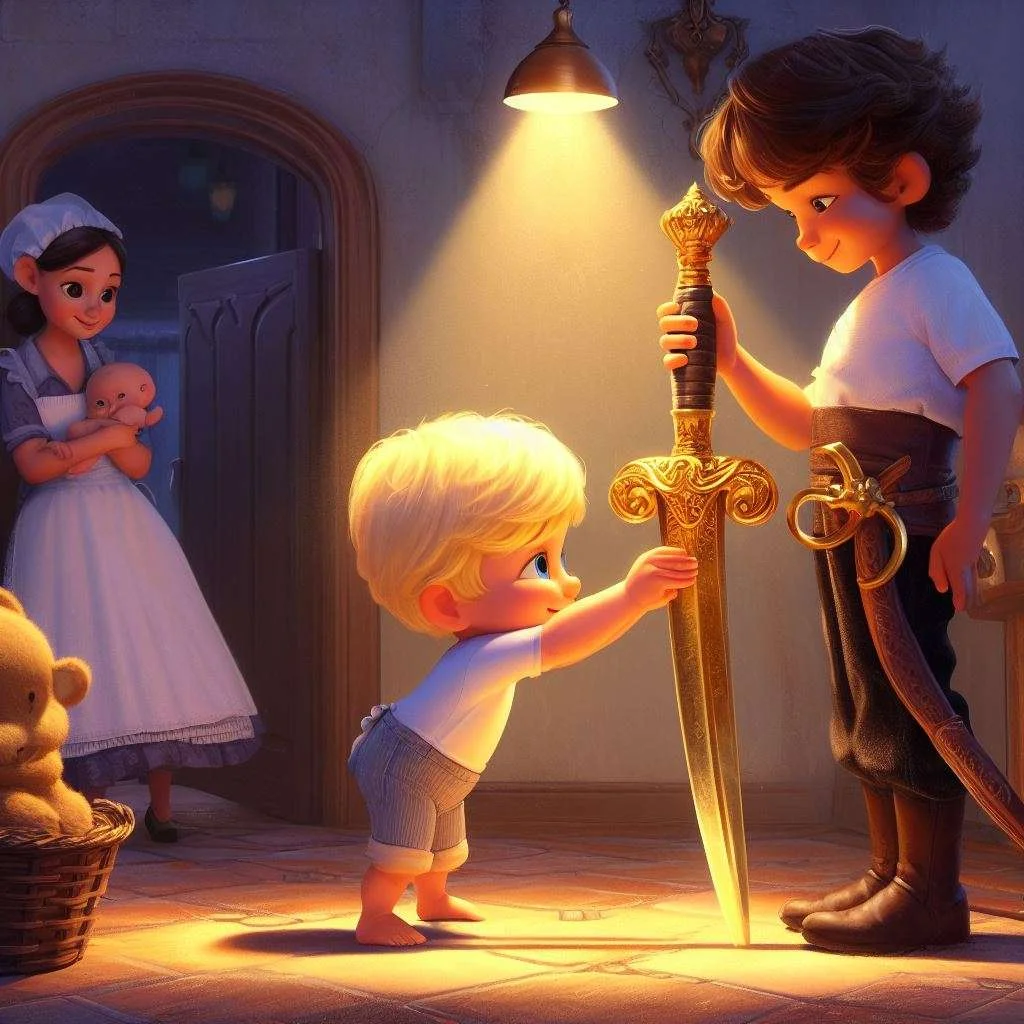Bebé is a magnificent child of five. He has very blond hair that falls in curls down his back, like the picture of the sons of King Edward. Bebé is dressed like the little Duke Fauntleroy, who wasn’t ashamed to be seen talking to poor children in the street.
They put him in short pants that cling to his knees, and a blouse with a sailor collar, white like the pants, and red silk stockings, and low shoes. Because they love him very much, he loves others very much. He’s not a saint, oh no! He makes faces at his French maid when she doesn’t want to give him more candy, and one day he sat down in a visit with his legs crossed and broke a very beautiful vase while chasing a cat.
But as soon as he sees a barefoot child, he wants to give him everything he has: he brings sugar to his horse every morning and calls it ‘my dear little horse’; he spends hours and hours with the old servants, listening to their tales of their African homeland, when they were princes and kings with many cows and elephants.
And, every time he sees his mother, he wraps his little arm around her waist or sits next to her on the stool, begging her to tell him how flowers grow, where the light comes from for the sun, what sewing needles are made of, and whether it’s true that silk for her dress is made by some worms, and if the worms are building the earth, as that man with glasses said yesterday in the drawing room.
And his mother tells him yes, there are some worms that build little houses of silk, long and round, called cocoons, and that it’s time to go to bed, like the little worms who crawl into their cocoons until they come out as butterflies.
And then Bebé looks very handsome at bedtime, with his fallen socks and his rosy color, like the children who bathe a lot, and his nightgown, just like the angels in the paintings, an angel without wings. He hugs his mother tightly, really tight, with his little head down, as if he wanted to stay in her heart.
He jumps and does somersaults and leaps on the mattress with his arms raised, trying to reach the blue butterfly painted on the ceiling. He pretends to swim as if in the bath, or pretends to brush the bed rail, because he’s going to be a carpenter. Or he rolls around the bed like a spinning top, with his blond curls mixed with the red stockings.
But tonight Bebé is very serious, not doing his usual flips and somersaults, not hanging on his mother’s neck to keep her from leaving, not asking Luisa, the little French maid, to tell him the story of the big glutton who died alone and ate a watermelon. Bebé closes his eyes, but he’s not asleep; Bebé is thinking.
Truth be told, Bebé has a lot to think about, because he’s going to Paris, as he does every year, with his mother to see the good doctors who will tell her what medicines she needs to make her cough go away, that nasty cough that Bebé doesn’t like to hear. His eyes fill with tears as soon as he hears his mother cough, and he hugs her tightly as if trying to hold her in place.
This time, Bebé is not traveling alone to Paris, because he doesn’t want to do anything alone, like the man with the watermelon, but with his little cousin Raúl, who has no mother.
Bebé and Raúl are going to Paris together to see the man who calls the birds, and the store at the Louvre that gives balloons to children, and the Guignol theater, where the puppets speak, and the policeman arrests the thief, and the good man gives the bad man a slap. Raúl is going with Bebé to Paris.
The two of them board the big steamship with three chimneys on a Saturday. In their cabin, Raúl is with Bebé. Poor Raúl, who doesn’t have blond hair, doesn’t dress like a little duke and doesn’t wear red silk stockings.
Bebé and Raúl have made many visits today: they went with their mother to see the blind people who read with their fingers, in books with very large letters; they went to the newspaper street to see how poor children without homes buy newspapers to sell them later and pay for their houses; they went to an elegant hotel with servants in blue coats and yellow pants to see a very skinny and formal man, Mama’s uncle, Señor Don Pomposo.
Bebé is thinking about the visit to Señor Don Pomposo. Bebé is thinking. With his eyes closed, he thinks and remembers everything. How tall, how tall Uncle Mamá’s friend is, like telegraph poles! What a long watch chain, and how it dangles, like a skipping rope! What an ugly big pearl, like a piece of glass, the pearl on his necktie! And he didn’t let Mama move, and he put a cushion behind her back, and he put a footstool at her feet, and he talked to her as they say queens are spoken to! Bebé remembers what the old servant said, that people talk to Mama like that because Mama is very rich, and that Mama doesn’t like it because Mama is good.
And Bebé thinks again about what happened during the visit. As soon as they entered the room, Señor Don Pomposo shook Bebé’s hand, like men do to popes; he put Bebé’s little hat on the bed, as if it were something sacred, and kissed him many times, ugly kisses that stuck to his face like stains. But Raúl, poor Raúl, wasn’t greeted, wasn’t asked to take off his hat, and wasn’t given a kiss.
Raúl was sitting in an armchair, his hat in his hand, with big eyes. And then Señor Don Pomposo stood up from the red sofa: ‘Look, Bebé, look what I have for you. This costs a lot of money, Bebé. This is for you, little boy.’ And he took out of his pocket a keychain with about thirty keys, and opened a drawer that smelled like Luisa’s dressing table and brought Bebé a golden saber—oh, what a saber, what a magnificent saber!—and fastened the patent leather belt around Bebé’s waist—oh, what a luxurious belt!—and said, ‘Go ahead, Bebé, look at yourself in the mirror; this is a very valuable saber, just for you, my dear child.’ And Bebé, very happy, turned his head toward where Raúl was sitting, looking at him, looking at the saber, with his eyes wider than ever and his face very sad, as if he were going to die: ‘Oh, what an ugly saber, so ugly! Oh, what a mean uncle!’ That’s what Bebé was thinking about. Bebé was thinking.
The saber is there, on the dressing table. Bebé raises his head slowly so that Luisa won’t hear him, and sees the shiny hilt like it’s made of sunshine because the lamp light falls on it. This is what the generals’ sabers look like on the day of the parade, just like the soldiers in the Christmas story. And something is written on the blade, right where the sun is. Bebé leans closer and looks closely. Oh, what a strange thing! Bebé reads what’s on the blade. It says, ‘For you, Bebé, the saber.’ And below, ‘to defend the Fatherland.’ Bebé reads what’s on the blade, and reads it again.
Bebé doesn’t feel happy. Bebé is thinking. Bebé stands on the bed. Bebé falls to the floor. Bebé stands up again and looks at the saber. Luisa has heard something. Bebé gets off the bed. Bebé says to Luisa, ‘Luisa, what is the Fatherland?’ And Luisa says to Bebé, ‘The Fatherland, Bebé, is the land where we are born, where our parents and friends are, where we live happily.’ Bebé thinks for a while and then says to Luisa, ‘And is the Fatherland big or small?’ And Luisa replies, ‘The Fatherland is big, Bebé, very big.’ So Bebé, with the saber in his hand, looks at Raúl, who is sitting in the armchair, looks at Luisa, and then looks at the saber, and says softly, ‘Raúl, you don’t have a Fatherland, do you?’ Raúl, Bebé’s little cousin, nods sadly, and Bebé continues, ‘Then, Raúl, the Fatherland is big, and I am small; but the saber is very big, and I am small.
I don’t want the saber, Raúl; I want you to have a Fatherland too.’ And thus, Bebé, with his generous heart, decides to give up the golden saber so that Raúl can also dream of a bright future. This story celebrates Bebé’s kindness and empathy, as he values the happiness and well-being of his cousin over expensive gifts. Ultimately, Bebé teaches us that true greatness lies in sharing and caring for others.
Also Read: Raven Steals the Light
Follow up Questions
- Why do you think Bebé decided to give his golden saber to Raúl? What does this tell you about Bebé’s character?
- What is the significance of the word “Patria” in the story? How does Bebé’s understanding of “Patria” change throughout the story?
- How would you describe the lesson or moral of the story? What can we learn from Bebé’s actions and generosity?
Note
“La Edad de Oro” (translated as “The Golden Age” in English) is a collection of essays, stories, and poems written by Martí, primarily aimed at children and young readers. The story “Bebé and Señor Don Pomposo” is one of the pieces in this collection, and it tells the heartwarming tale of Bebé’s generosity and empathy.
Overall, “La Edad de Oro” is a significant work in Latin American literature and is known for its emphasis on moral values, education, and social justice.

